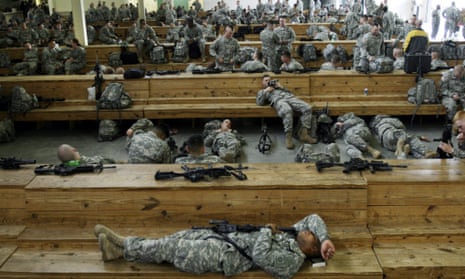An Afghan woman heaves a pot of chickpeas into the yard outside her home and balances it on a makeshift fire fed with precious scraps of cardboard. The American soldiers who are stationed nearby keep their distance behind sandbag barricades, watching and waiting, occasionally tossing candy to the children. The woman can see her adolescent son and his friends scuffling in a nearby alley. When their play turns suddenly violent, she is gripped by fear of what he might become, in this world without peaceful choices. “He would be a leader,” she thinks, “but of what?”
Tense and laden with the kind of detail that can only come from close observation, this scene is part of a short story by Kristen L Rouse, a Brooklyn writer and veterans’ advocate who served three tours in Afghanistan. Rouse was one of 11 readers who presented their work on a recent rainy Saturday afternoon at the headquarters of New York University’s creative writing program.
All had served in the US military, and all had honed their craft in the workshops that have sprung up across the country to help veterans articulate what they’ve seen and done at war. A spate of well-received memoirs and novels by American veterans of Iraq and Afghanistan – most recently ex-marine Phil Klay’s National Book Award-winning collection Redeployment – have proven there’s a public appetite for them.
Many of the afternoon’s readers had served in Iraq or Afghanistan, but there were voices from Vietnam and Korea – George Broadhead, born in 1932, told the room he was making up for his age by attending three workshops and working on his first novel. These writers work in a mix of memoir and fiction, sometimes wavering uneasily between the two. Questions of perspective and responsibility are the major themes. Again and again, they described failures of communication between soldiers and civilians, both in country and at home, in terms both heartfelt and profane.
Brandon Willitts, whose nonprofit Words After War co-sponsored the reading, enlisted in the navy after September 11 and served for five years as an intelligence specialist at the Pentagon and then in Kandahar. On his return, he enrolled at a small liberal arts college in Vermont, where studying literature, which “changed not only how I see the world, but also how I see myself in the world”. In 2013, inspired by the conviction that reading and writing literature “should be an essential part of the process of coming home after war”, he founded Words After War to facilitate that.
“Although writing can be therapeutic, it is not a replacement for mental health therapy,” he says. Words After War prefers to focus on craft, which it thinks will help veteran stories reach a broader audience. “It isn’t enough simply to give veterans a space to tell their stories to one another,” Willitts says. “We need to make war and conflict and the veteran experience much more inclusive and open to civilians.”
To that end, Words After War runs writing workshops focused on literary craft, writer-in-residence programs for veterans, and mentorships pairing veteran writers with literary professionals – all with a goal of bringing together “diverse populations in conversation on literature and conflict”. As a sign that his approach is working, Willitts proudly points out that one of his readers, Teresa Fazio, a former marine officer who contributes to the New York Times’s At War blog, will be the first female military veteran to attend the prestigious Yaddo writers’ retreat this spring.
Veterans’ writing programs have begun to spread across the country. Some, as in New York, are based at universities like Columbia and Fordham. Others are independent, like New York’s Voices from War, Philadelphia-based Warrior Writers and the Veterans Writing Project in Washington DC.
Willitts jokingly compared the leaders of the different writing workshops in New York to the joint chiefs of staff. “We often serve the same students, and I personally know every other facilitator in the city,” says Maurice Decaul, a former marine who served in Iraq during the 2003 invasion, and is now a veteran workshop leader at NYU, where he’s an MFA candidate. “I thought it made sense to get everyone in the room to share ideas, as well as support our students with the widest audience we could gather.”
Matt Gallagher, a Words After War instructor and author of the irreverent Iraq memoir Kaboom, who was the last speaker of the afternoon. He explained that it’s become clear that there’s an audience eager to hear from those who served in Iraq and Afghanistan. Where once the veteran writing community was slapped with labels like “emerging” and “growing” – well-meaning, perhaps, but double-edged – there’s now only one that feels accurate, as far as Gallagher and his peers are concerned: “Thriving.”

Comments (…)
Sign in or create your Guardian account to join the discussion